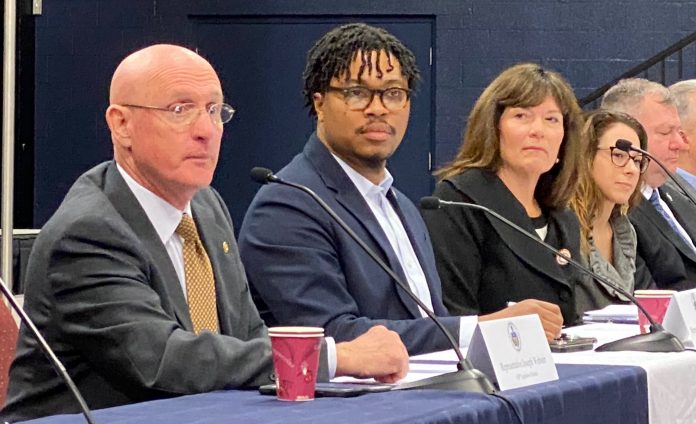The House Mental Health Caucus hosted a bipartisan panel of legislators from Philadelphia and the suburbs headed by Reps. Wendi Thomas (R-Bucks) and Malcolm Kenyatta (D-Philadelphia) to find solutions to the crisis of suicide among school students.
“Mental health is an issue that does not discriminate,” Thomas said. “It affects all ages, races, genders and classes. Chances are that each of us knows an individual who has struggled with mental health issues, and we all hope that those close to us would be able to get the necessary assistance in times of desperation. Unfortunately, as many as 60 percent of students do not receive the treatment they need due to stigma and lack of access to resources.”
“I am thrilled to have been a part of this discussion which transcends bipartisanship because, as public servants, we are all obligated to ensure our residents are physically, emotionally and mentally well,” Kenyatta said. “Mental health has always been a pressing and coincidingly stigmatized issue in our society. I have been a longtime advocate for breaking those stigmas and promoting comprehensive solutions to ensure the well-being of our children.”
Thomas and Kenyatta called for the hearing to take testimony on the scope of suicide within Pennsylvania schools and find solutions to stem the crisis. Kenyatta serves on the unprecedented statewide Suicide Prevention Task Force.
Thomas and Kenyatta have co-sponsored House Bill 1622, also known as Phillip’s Law, named after an 11-year-old bullied boy in Kenyatta’s district who took his life after he was unable to reach the school guidance counselor. The bill would require the Department of Education to investigate the number of mental health professionals in schools to help legislators craft solutions to increase the number of school mental health professionals to meet nationally accepted standards.
According to Mike Fiore, school social worker with the Council Rock School District, and a former Bucks County juvenile probation officer, the number of suicide interventions within the CRSD has increased from 168 in 2014 to 261 in 2019.
“We see this at each grade level – elementary, middle and high school,” Fiore said. “Each of these mental health issues can exist on their own or in a comorbid fashion, and one can exacerbate the other.”
“In most cases, children feel a lack of support and don’t know where to turn due to poor relationships with parents or peers, and feelings of social isolation,” said David Rubenstein, managing director of Kaleidoscope Education Solutions Inc. “A family history of depression or suicide, emotional, or physical/sexual abuse are also large contributors of teen suicide.”
“Over the last two decades, there has been a focus on implementation of evidence-based programs in schools in order to promote children’s mental health and well-being,” said Jennifer Mautone, PhD, ABPP, clinical director of Healthy Minds, Healthy Kids at Children’s Hospital of Philadelphia. “School-based programs are less stigmatizing than traditional outpatient behavioral health care.”
“Our challenge is to find ways to effectively, yet efficiently, help kids in the school settings,” Thomas said.
The legislators will share the testimony given with colleagues as House Bill 1622 moves through the House.
Those who attended the hearing included Reps. Meghan Schroeder (R-Bucks), Todd Polinchock (R-Bucks), Wendy Ullman (D-Bucks), Perry Warren (D-Bucks), Joseph Webster (D-Montgomery), Michael Schlossberg (D-Lehigh), Dan Williams (D-Chester) and Joseph Hohenstein (D-Philadelphia).
“It’s so encouraging to see, not only so many legislators attend our hearing, but such a bipartisan group as well,” Thomas said. “Nothing is more important than serving our students as they are our future.”


